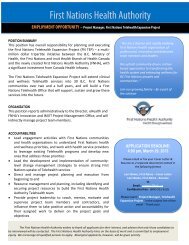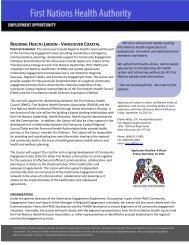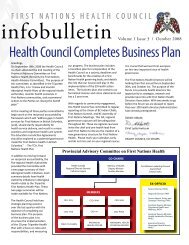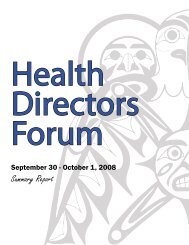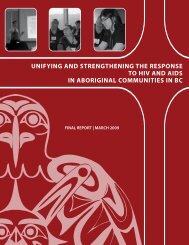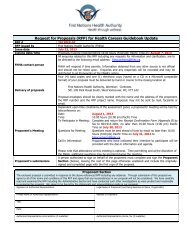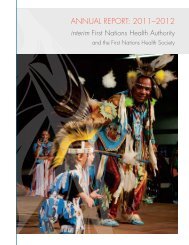pdf download - First Nations Health Council
pdf download - First Nations Health Council
pdf download - First Nations Health Council
You also want an ePaper? Increase the reach of your titles
YUMPU automatically turns print PDFs into web optimized ePapers that Google loves.
At the 1 st Annual Forum, a number of<br />
challenges and opportunities were identified as<br />
well as priorities for action, which included the<br />
establishment of the <strong>First</strong> <strong>Nations</strong> <strong>Health</strong> <strong>Council</strong>,<br />
and informing the completion of the Tripartite <strong>First</strong><br />
<strong>Nations</strong> <strong>Health</strong> Plan, signed on June 11, 2007.<br />
The Tripartite <strong>First</strong> <strong>Nations</strong> <strong>Health</strong> Plan marked<br />
the beginning of significant change for <strong>First</strong> <strong>Nations</strong><br />
health care in British Columbia. Regional Director<br />
lappe shared that minister Clement had often<br />
said that signing the Plan was one of his proudest<br />
accomplishments. BC was leading the way for<br />
fundamental changes for <strong>First</strong> <strong>Nations</strong> health<br />
service delivery, and was being closely observed<br />
by other provinces who were hoping to learn from<br />
BC’s successes.<br />
Regional Director Lappe shared that since<br />
the 1980s, <strong>Health</strong> Canada had been involved in<br />
a process to transfer health services historically<br />
delivered by <strong>Health</strong> Canada to <strong>First</strong> <strong>Nations</strong>.<br />
She continued that the Tripartite <strong>First</strong> <strong>Nations</strong><br />
<strong>Health</strong> Plan was a fundamental rethinking and<br />
realignment of how health services would be<br />
delivered for <strong>First</strong> <strong>Nations</strong> in British Columbia in<br />
a way that made sense for communities, with<br />
evaluation and monitoring by the regional offices<br />
and headquarters.<br />
Central to the Tripartite <strong>First</strong> <strong>Nations</strong> <strong>Health</strong><br />
Plan was a commitment to create a new governance<br />
structure that would enhance <strong>First</strong> <strong>Nations</strong> control<br />
of services, and promote better integration and<br />
coordination of services, to ensure improved access<br />
to quality health care by all <strong>First</strong> <strong>Nations</strong> living<br />
in British Columbia. The significant progress of the<br />
<strong>First</strong> <strong>Nations</strong> <strong>Health</strong> <strong>Council</strong>, which had actively<br />
sought partnership opportunities focused on the<br />
needs of <strong>First</strong> <strong>Nations</strong> communities, was acknowledged.<br />
Regional Director Lappe said that change would<br />
not happen overnight and that the transition plan<br />
would be a key component of the agreement to be<br />
reached. meanwhile, within bC Region, opportunities<br />
were being explored for interchanges between<br />
the <strong>First</strong> <strong>Nations</strong> and Inuit <strong>Health</strong> Branch and the<br />
<strong>Health</strong> <strong>Council</strong> to help pave the way for a smooth<br />
transition to the new <strong>First</strong> Nation governing body.<br />
As the first year anniversary of the signing of<br />
the Tripartite <strong>First</strong> <strong>Nations</strong> <strong>Health</strong> Plan approaches,<br />
there is opportunity to reflect on the successes<br />
achieved thus far, and to confirm the way<br />
forward. Over the past year, <strong>Health</strong> Canada has<br />
worked closely with its partners, building strong<br />
relationships, completing the initial work plan, and<br />
aligning efforts on a number of fronts to ensure a<br />
tripartite approach to program and service design<br />
and delivery. Efforts had also been made to initiate<br />
dialogue for the establishment of a new <strong>First</strong><br />
<strong>Nations</strong> health governing body.<br />
Regional Director Lappe acknowledged that<br />
while this was still the first year of implementation<br />
of the Tripartite <strong>First</strong> <strong>Nations</strong> <strong>Health</strong> Plan, change<br />
was already happening. Efforts would continue to<br />
adjust how we are working together as well as on<br />
aligning efforts and resources to make initiatives<br />
much more effective in moving forward. She<br />
concluded by recognizing the exciting linkages<br />
occurring between <strong>First</strong> <strong>Nations</strong> and <strong>Health</strong><br />
Authorities within BC. She thanked all parties for<br />
having the courage and energy to participate, and<br />
looked forward to continued collaborative efforts.<br />
Deborah Schwartz<br />
Executive Director, Aboriginal <strong>Health</strong> Branch<br />
BC Ministry of <strong>Health</strong><br />
“It takes tremendous leadership to get into a<br />
canoe and paddle in the same direction as others<br />
in the interest of all.”<br />
ms. Schwartz referenced the photograph on the<br />
cover of the Transformative Change Accord: <strong>First</strong><br />
<strong>Nations</strong> <strong>Health</strong> Plan which depicted three people<br />
paddling a canoe. She acknowledged the visual as<br />
a unifying metaphor about getting into the same<br />
canoe while paddling in the same direction, which<br />
took tremendous leadership in the interest of all.<br />
The excellence of the provincial, federal and <strong>First</strong><br />
<strong>Nations</strong> leadership involved in this initiative was<br />
recognized.<br />
It was shared that <strong>First</strong> <strong>Nations</strong> had brought<br />
together three political organizations in British<br />
Columbia to develop a unified vision to inspire,<br />
and that there was need to acknowledge the Chiefs<br />
for that work. ms. Schwartz also recognized the<br />
leadership of the <strong>First</strong> <strong>Nations</strong> <strong>Health</strong> <strong>Council</strong>, and<br />
its staff who were responsible for translating the<br />
Plan into actions on a day to day basis. She noted<br />
that it was remarkable for the parties to have made<br />
a commitment to overcome their differences,<br />
and to work together to achieve results guided by<br />
the vision and values set out in the Tripartite <strong>First</strong><br />
<strong>Nations</strong> <strong>Health</strong> Plan.<br />
7<br />
VANCOUVER, bC • mAY 20 - 21 , 2008



